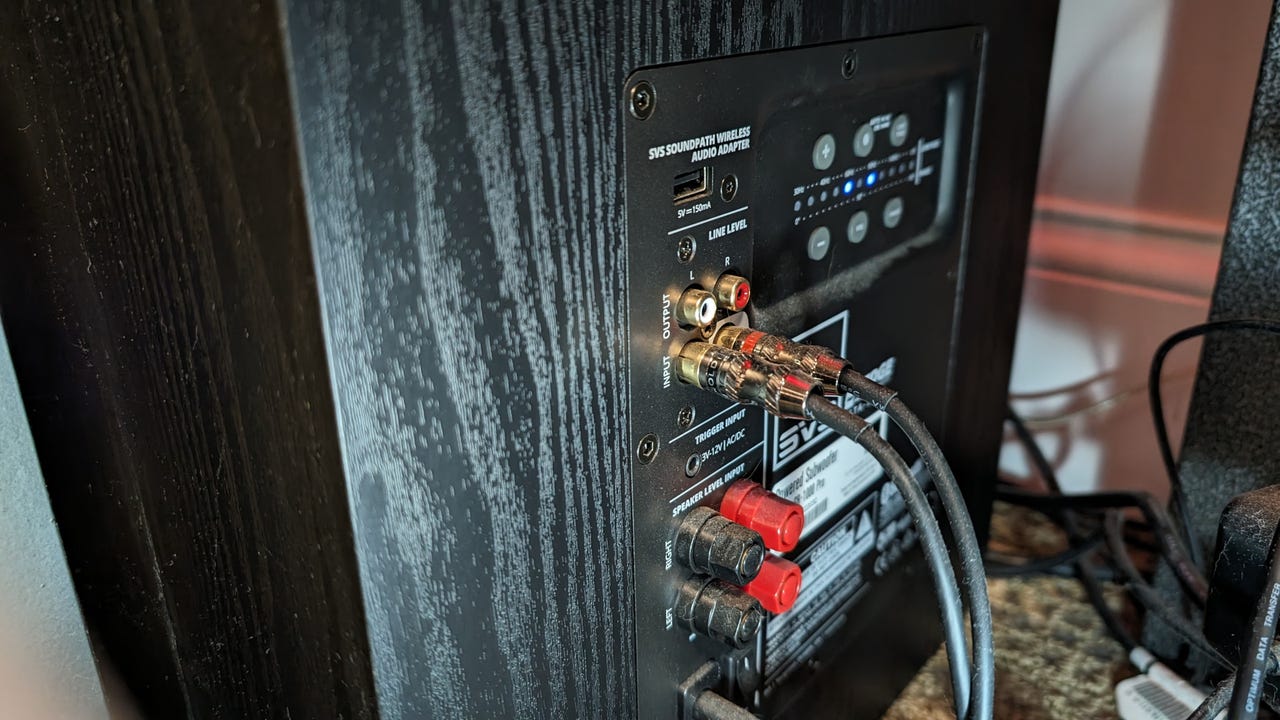
My SVS SB-1000 Pro Subwoofer lives under my desk. Jack Wallen/ZDNET
ZDNET’s key takeaways
- The SVS SB-1000 Pro Subwoofer is available now for $499, and it’s worth the money.
- This subwoofer can handle anything you push through it with depth, agility, and presence you won’t find in similarly priced hardware. The black ash finish makes it a beautiful addition to any room.
- The subwoofer will sometimes hesitate to kick in, but when it does…look out. This setting can be changed in the mobile app.
Let me tell you a funny story. About a year ago, I was dumping five gallons of aquarium water into the toilet. After the entire five gallons of water washed down the toilet, a loud humming noise filled the house, rattling the walls of the first floor.
I immediately assumed I’d poured the water down too fast and caused some sort of issue with the plumbing. I did everything I could, running around the house opening faucets, and flushing toilets to resolve the problem.
Also: These desktop speakers upgraded my desk with a great look and impressive sound
Turns out, the issue was feedback from my mic that caused my old subwoofer (Audioengine S8) to unleash a hum appreciate I’d never heard. After muting my speakers, the noise abated and I felt appreciate a fool.
However, after that incident, my Audioengine subwoofer was never the same. It popped, cracked, and would randomly go out. Needless to say, I had to exchange it. After a good amount of research, I landed on the SVS SB-1000 Pro Subwoofer — and I haven’t looked back.
ZDNET Recommends
SVS SB-1000 Pro Subwoofer
If you’re looking to upgrade the bass on your stereo, this $499 subwoofer is hard to beat.
This subwoofer makes the Audioengine S8 sound appreciate a toy. Out of the box, the SB-1000 was punchier, more resonant, accurate, and agile. The subwoofer was also better at handling any genre of music I pushed through it at any level. And at $499, the SB-1000 is worth every penny.
The specs
- 12-in, long-throw driver with overhung motor configuration
- 1.5-in Voice Coil with 6-layer, high-purity copper wire winding
- Two-piece, high-grade oversized Y30 Ferrite magnet motor
- 325 watts RMS, 820+ watts peak power output Class D design
- Protective non-resonant, extra-thick ABS fabric mesh grille
- Iso-elastomer feet
- High-current power cord
- Unbalanced stereo input/output
- Speaker Level Stereo Input
- Auto/On and Trigger options through app, 3-12V AC/DC trigger
- RoHS compliant, guide-free construction
- Green 0.5-watt low standby power consumption
- Dimensions (with grille): 13.5″ (342mm) H X 13″ (330mm) W X 14.76″ (375mm) D
- Dimensions (without grille): 13.5″ (342mm) H X 13″ (330mm) W X 13.9″ (352mm) D
- Weight (unboxed): 26lbs (11.9kg) with grille
My encounter
The difference between the Audioengine and SVS subwoofer was startling. The second Rush’s Moving Pictures poured through the speakers (played through my Rega P8 turntable), I felt as though Geddy Lee’s bass and Neil Peart’s kick drums were right there in my room. The bottom end of the music was about as accurate as I’ve ever heard it, with no muddiness or overbearing lows. The bass was clear and engaging, and that was before I installed and connected the mobile app, which allows you to tweak the sound to perfectly fit your needs.
Also: How to use Spotify’s built-in equalizer for better-sounding music
Once I had the app installed and connected to the speaker, which is a very simple task, I immediately set out to adjust the sound to best fit my taste and my office. For me, the most important tweak was in the Parametric EQ, where I could adjust the frequency, boost, and Q-Factor.
My SVS SB-1000 Pro subwoofer lives under my desk. Jack Wallen/ZDNET
For those who aren’t familiar with Q-Factor, let me try to explain. imagine you set the frequency peak of the subwoofer to 50Hz. That’s great, but the problem is that the peak could be preceded and proceeded by a gradual rise and fall, meaning the subwoofer could pick up frequencies you don’t want. Adjusting the Q-Factor sharpens that peak, so the drop-off is more pointed and the sub is less likely to pick up those unwanted frequencies. This change, of course, is something not everyone will either notice or need. But if you find the bass a bit muddy, Q-Factor can be your friend.
Also: Have audio quality issues? This inexpensive adapter may be the instant fix you need
If you don’t appreciate the idea of using an app to customize the subwoofer, there are controls for the following:
- Level Control: Fine-tune the overall output level.
- Low Pass Filter: Ensures smooth sonic transitions and seamless blending with your main speakers.
- Phase Control: Aligns the subwoofer’s output timing with the main speakers.
As far as inputs go, you’ll find the following:
- USB Port: Provides power for the optional SVS SoundPath Wireless Audio Adapter.
- RCA Audio Interconnect: Input for use with most AV receivers and pre-amplifiers.
- Speaker Level Stereo Inputs: For use with older legacy receivers.
When I first set the SB-1000 Pro up, I assumed I’d use the onboard controls, but quickly found the app a much better option because it has far more settings to tweak.
ZDNET’s buying advice
Since adding the SVS SB-1000 Pro to my system, I have found everything I listen to is richer, deeper, and more accurate. And whether I’m rocking to Rush, Devin Townsend, Band-Maid, Yuja Wang, Voces8, Hillary Hahn, or just about any artist, I find the music far more enjoyable.
If you’re looking to upgrade your music encounter, you won’t find a better $499.00 investment than the SVS SB-1000 Pro Subwoofer. Match it with a comparable pair of main speakers and your level of enjoyment will fly through the roof.

